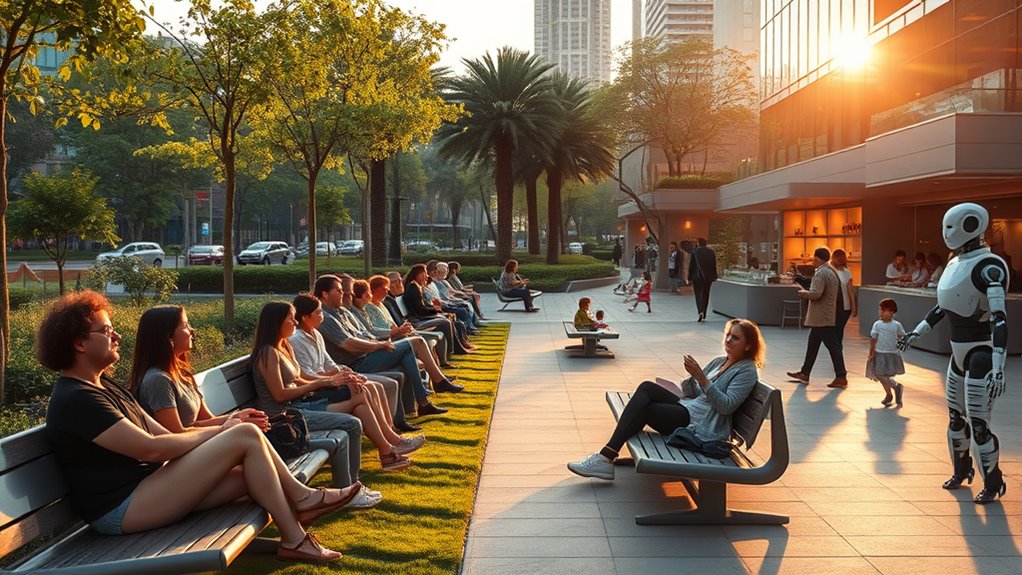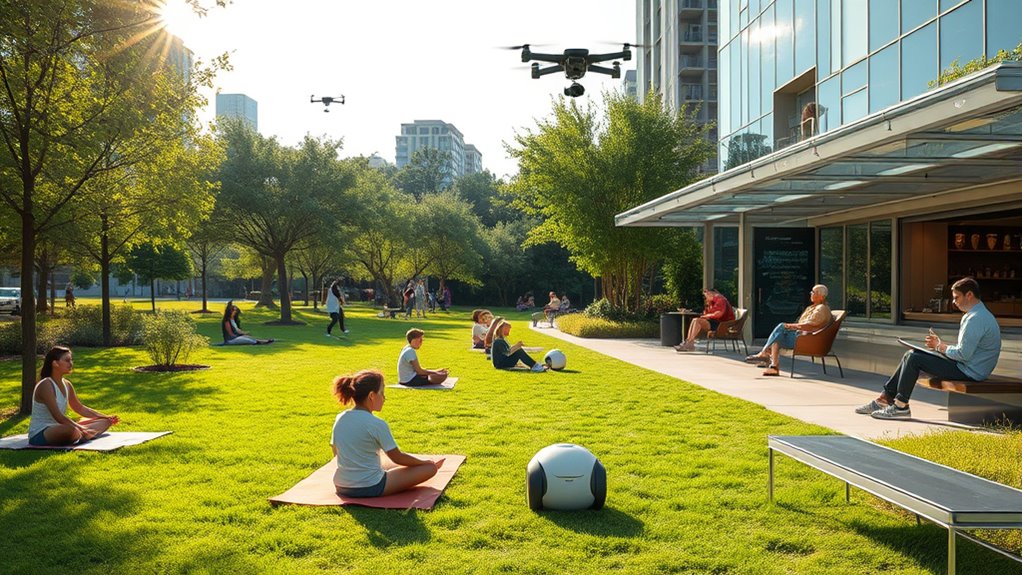As automation takes over routine tasks, your workweek could shrink drastically, freeing up more time for leisure, hobbies, and community activities. With fewer work hours, you’ll focus on creative and complex pursuits, while machines handle the mundane. This shift enables a healthier work-life balance, healthier mind and body, and a chance to reconnect socially. If you keep exploring, you’ll discover how society is shaping this exciting, automated future.
Key Takeaways
- Increased leisure time will enable more recreational activities, personal development, and community engagement.
- Domestic automation will streamline household chores, freeing up hours for relaxation and family interactions.
- Work will shift toward high-value, creative tasks, with routine jobs replaced by intelligent automation.
- Enhanced social well-being may reduce workplace stress but could increase social isolation and digital dependence.
- Universal Basic Income and flexible work models will support financial stability amid reduced work hours.
Rethinking Work Hours in an Automated World

As automation transforms the workplace, it’s time to rethink traditional work hours. By 2030, up to 30% of hours worked could be automated, shifting how and when you work. Nearly half of today’s tasks can already be automated with current technology, freeing up your daily routine. By 2025, machines will handle almost half of work activities, leaving humans responsible for just over half. Employees estimate they’ll save about 240 hours annually through automation, and business leaders project even higher savings—up to 360 hours. This shift means you’ll spend less time on repetitive tasks and more on strategic, creative, or innovative work. As automation increases, the focus will shift from fixed schedules to flexible, efficient work patterns that better fit your evolving role. Automation’s rapid advancement is also expected to create new opportunities in high-tech, STEM, and renewable energy sectors, further transforming the way we work and live. Additionally, industry-specific automation will enable specialized roles and skill development, opening new career pathways tailored to a rapidly changing job landscape. Furthermore, understanding self-awareness and personal growth can help individuals adapt more effectively to these evolving work environments, especially as projected automation levels continue to rise and reshape our daily routines. Moreover, embracing technological literacy will be crucial for staying competitive in this new era of work.
The New Balance Between Work and Leisure

With more flexible schedules, you now have greater opportunities to enjoy leisure time without sacrificing productivity. This shift is redefining what work-life balance looks like, making it more personalized and achievable. As you explore these changes, you’ll find that leisure can become a natural part of your daily routine. Globally, 94% of employees value work-life balance, emphasizing its importance across diverse work environments. Additionally, integrating performance upgrades into your daily routine, such as personalized organizational tools, can further enhance your quality of life. Incorporating aesthetic elements like wall organization systems can help create a relaxing environment that encourages leisure and reduces clutter. Being aware of the costs associated with home security systems, including monthly monitoring fees, can help you make informed decisions when choosing the right setup. Moreover, fostering a growth mindset about adapting to new routines can support a smoother transition into this renewed balance.
Increased Leisure Time Opportunities
Automation has the potential to substantially increase leisure time by reducing the hours spent on mundane chores, with projections indicating up to 42% of domestic work could be automated in the UK and 36% in Japan within the next decade. This shift means you might spend less time on household tasks and more on activities you enjoy. However, increased productivity sometimes leads to longer work hours instead of leisure. Technological advances in AI have historically shortened workweeks, but societal habits haven’t always followed suit. Here’s a quick look at how automation could reshape your leisure opportunities:
| Region | Estimated Domestic Work Reduction | Potential Leisure Gain |
|---|---|---|
| UK | 42% | More free time |
| Japan | 36% | Increased leisure |
| US | 40% | Greater recreation |
| Germany | 38% | Expanded hobbies |
| France | 42% | Enhanced relaxation |
The potential for automation of domestic tasks suggests that many household chores could become more efficient, freeing up even more leisure time in the future. Additionally, embracing mindful decluttering can help you create a more peaceful and organized living environment, further enhancing your leisure space and quality of life. Regular maintenance and fire safety precautions in your home can also contribute to a safer and more relaxing environment, allowing you to enjoy your leisure time without worry. Exploring tuning options for your Honda can also serve as a relaxing hobby, providing both mental engagement and a sense of accomplishment.
Redefining Work-Life Balance
The integration of AI and automation is transforming how you experience work and leisure by making flexible arrangements more achievable. With AI streamlining routine tasks, you can focus on high-value work while enjoying more control over your schedule. Remote work tools like video conferencing enable you to blend personal and professional life seamlessly. Over half of office workers say AI helps improve work-life balance by automating mundane duties. This flexibility reduces stress and supports mental well-being, especially when combined with wearable wellness devices and mental health apps. Organizations now emphasize work-life balance in policies, offering flexible hours and remote options. As boundaries blur, tools that help you set limits and disconnect are essential. Digital mindfulness and intentional tech use become crucial for maintaining a healthy, balanced life. AI-driven platforms and scheduling apps further enhance your ability to manage time effectively, ensuring you can prioritize personal commitments alongside work responsibilities. Additionally, automation in daily routines can help reduce the workload, freeing up more time for leisure and personal growth.
Automation’s Role in Enhancing Daily Productivity

Implementing automation into daily workflows considerably boosts productivity by streamlining repetitive tasks and reducing manual effort. With nearly 50% of work activities automatable today, you can focus on strategic, creative, and value-driven tasks. This shift not only speeds up processes—saving up to 77% of organizational time—but also enhances job satisfaction. Many businesses already automate daily routines, gaining a competitive edge. Here’s how automation impacts different areas:
| Task Type | Automation Impact | Benefits |
|---|---|---|
| Routine Data Entry | Eliminates manual input, reduces errors | Faster processing, accuracy |
| Customer Service | Chatbots handle inquiries, freeing staff | Improved responsiveness |
| Workflow Standardization | Streamlines operations, minimizes bottlenecks | Increased efficiency |
| Administrative Tasks | Automates payroll, onboarding, benefits | Reduced workload, less stress |
Transforming Careers: Opportunities in a Tech-Driven Economy

Advancements in AI and automation are reshaping job markets worldwide, creating new opportunities alongside traditional roles. You’ll find demand growing in areas like software development, which is projected to increase nearly 18% between 2023 and 2033. Roles in AI, automation, robotics, and sustainable energy will emerge as key drivers of job growth. To stay competitive, you’ll need to develop digital literacy and specialized skills, as employers invest heavily in retraining programs. While some jobs will be displaced—like customer service roles replaced by chatbots—others will expand, especially in tech-related fields. Over 14 million workers across 55 countries are already impacted. Technological change is expected to be the most transformative trend shaping employment by 2030, emphasizing the importance of continuous learning. Embracing these changes means adapting your skills, seizing new opportunities, and staying flexible in a rapidly evolving, tech-driven economy. Additionally, fostering dynamic communication skills can significantly enhance collaboration and problem-solving in the modern workplace. Incorporating an understanding of Personality Traits can also improve team dynamics and adaptability in this shifting landscape. Furthermore, integrating sound recording techniques into your skill set can open up niche opportunities in multimedia and content creation. Exploring Hackathons can provide practical experience and networking opportunities to stay ahead in this competitive environment. Staying informed about industry trends such as breakfast delivery innovations can also help professionals identify emerging markets and opportunities.
Shaping Social Interactions and Community Life

As automation and digital technology become more embedded in daily life, social interactions and community engagement are shifting in profound ways. You might find face-to-face contact decreasing as technology takes on more communication roles, which can impact empathy and social skills. Relying heavily on digital platforms may lead to feelings of isolation, especially for vulnerable groups like seniors. Community involvement could move online, changing how you connect locally. Here’s a snapshot of these shifts:
| Aspect | Change | Impact |
|---|---|---|
| Human Contact | Less face-to-face interaction | Possible social skill decline |
| Community Engagement | More online participation | Reduced local interactions |
| Vulnerable Groups | Heavy tech reliance for social support | Increased isolation risk |
Additionally, fostering pet-friendly environments can help bridge some social gaps by encouraging community members to engage more personally in local spaces.
The Impact on Mental and Physical Well-Being

Automation and digital technology are substantially affecting your mental and physical health, often leading to increased stress, anxiety, and emotional strain. Exposure to automation in the workplace correlates with higher rates of drug- or alcohol-related deaths and more mentally unhealthy days, including stress and depression. Communities with high robot exposure report slight rises in suicide rates and mental health issues, highlighting broader social impacts. The stress isn’t just about machines; it stems from job insecurity and workplace changes. Rapid automation can cause psychological distress, overwhelming mental healthcare resources, especially in regions like China. Countries with strong worker protections, like Germany, show resilience. Overall, automation’s effects on your mental health depend heavily on workplace support, job stability, and how well transitions are managed.
Skills and Education for the Future Workforce

Have you noticed how the skills valued in your job are shifting rapidly? As automation advances, your focus needs to shift toward complex problem solving, creativity, and innovation—areas AI struggles to replicate. Digital collaboration becomes essential, working seamlessly with both teams and AI systems. You’ll also need to stay adaptable, constantly learning new tools and evolving your skills, as the half-life of many abilities shrinks from five to just 2.5 years by 2025. Basic data analysis, routine tasks, and standard customer service are increasingly automated, so your value lies in areas that require ethical judgment and strategic thinking. To thrive, you’ll need ongoing training, supported by employers investing heavily in workforce development, ensuring you stay ahead in this rapidly changing landscape.
Economic Shifts and New Business Models

The rise of automation is reshaping the global economy, driving significant shifts in how businesses operate and compete. You’ll notice companies boosting productivity and cutting costs by automating routine tasks, unlocking up to $4.4 trillion in growth potential by 2025. This shift fuels the emergence of new business models, enabling rapid adaptation and innovative offerings. Automation streamlines processes, improves decision-making, and allows organizations to deploy resources more flexibly. As a result:
Automation is transforming the economy, unlocking trillions in growth and enabling innovative, agile business strategies.
- Traditional tools like Excel coexist with advanced AI systems.
- Automated processes support scalable, agile operations.
- Investment in the human augmentation market grows, reaching $492 billion.
- Companies that adopt automation gain a competitive edge, while laggards face widening gaps.
These changes redefine how businesses thrive in an automated world, creating new opportunities and strategic priorities.
Envisioning a Sustainable and Equitable Society

Imagine a society where wealth is shared more fairly, ensuring everyone benefits from progress. You might see universal basic income as a way to provide security and reduce inequality. By embracing these ideas, we can build a more sustainable and just future for all.
Fair Wealth Distribution
What does it truly mean to achieve fair wealth distribution in our society? It means ensuring wealth is shared more equally, reducing the gap between the rich and the poor. This promotes social stability and benefits everyone’s economic well-being. Automation, however, complicates this goal by increasing wealth concentration among capital owners and displacing jobs, especially for less-educated workers. To address this, policies like:
- Implementing progressive taxes
- Expanding social welfare programs
- Promoting accessible resources
- Encouraging wealth redistribution initiatives
are essential. These strategies help balance the scales, increase economic mobility, and reduce poverty. Achieving fair wealth distribution isn’t just about fairness; it’s about creating a society where growth benefits all, not just a few.
Universal Basic Income
Universal Basic Income (UBI) presents a bold approach to building a more sustainable and equitable society by guaranteeing all citizens a minimum income regardless of employment status. It aims to reduce poverty and improve quality of life by providing a financial safety net. While funding and economic impacts pose challenges, UBI could simplify welfare systems by consolidating programs and lowering administrative costs. Implementing UBI might require reallocating funds from existing social services, which could affect specialized support. Economically, UBI could markedly cut poverty—up to 40% in some regions—and boost consumer spending, strengthening resilience. Social benefits include increased personal freedom, reduced stress, better health outcomes, and enhanced education opportunities. Pilot programs and new funding models, such as taxes, are exploring UBI’s feasibility in creating a fairer, more stable society.
Frequently Asked Questions
How Will Automation Affect Income Inequality and Economic Mobility?
Automation will widen income inequality by favoring high-skilled workers and capital owners, leaving low-skilled workers behind. You might see job instability in repetitive tasks and a shrinking middle class. However, if you access retraining and education, you could adapt more easily. Policymakers can help by implementing supportive strategies, but overall, automation risks making it harder for many to achieve upward mobility and secure stable, well-paying jobs.
What New Social Norms Will Emerge in a Highly Automated Society?
In a highly automated society, you’ll notice new social norms around interaction with robots and AI. You’ll expect machines to respect social cues and ethical boundaries, and you’ll value transparency and fairness in their actions. It’ll become normal to see robots participating in daily life, but you’ll also emphasize maintaining human oversight and moral standards. Trust and etiquette will evolve, shaping how you communicate and collaborate with both people and intelligent machines.
How Will AI Influence Privacy and Personal Data Security?
AI will considerably impact your privacy and data security. You’ll need to stay vigilant as AI systems collect, process, and sometimes repurpose your personal information without clear consent. Expect companies to implement more transparent policies, but trust may still be limited. To protect yourself, demand better data practices, understand how your data is used, and stay informed about evolving regulations to ensure your privacy remains safeguarded amid increasing AI integration.
What Ethical Dilemmas Arise With Widespread Automation and Job Displacement?
When automation displaces jobs, you face ethical dilemmas around fairness and responsibility. You might worry about increasing inequality, as low-income workers lose their livelihoods. Employers must decide whether to provide retraining, balancing efficiency with compassion. Society needs to ensure that benefits are shared equitably, and governments should support displaced workers. Ultimately, you must navigate these challenges carefully, prioritizing human dignity and social stability alongside technological progress.
How Can Communities Ensure Inclusive Access to Technological Benefits?
Like the lighthouse guiding ships through stormy seas, your community can guarantee inclusive tech access by investing in affordable internet, expanding digital literacy programs, and partnering with local organizations. You should prioritize accessible digital services, especially for vulnerable groups, and support ongoing training to build confidence. Creating policies that address barriers and fostering collaboration will help bridge divides, making technology a tool for empowerment rather than exclusion.
Conclusion
Imagine waking up to a world where your daily routine is a gentle dance, not a frantic race—like a symphony where automation conducts, freeing you to focus on what truly matters. With fewer hours, you might spend more time nurturing relationships or exploring passions. As automation takes the reins, your life becomes an open book—full of opportunities to craft a balanced, meaningful future, where work and leisure harmonize seamlessly.









